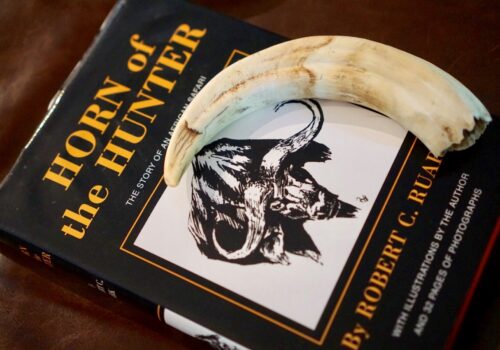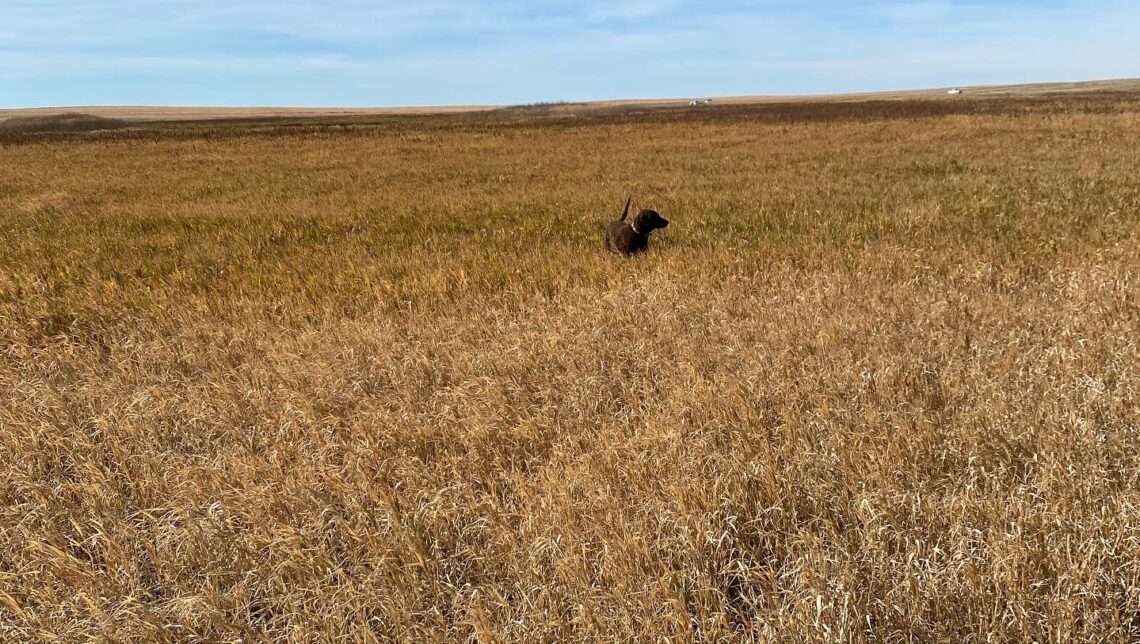
Ode To A Chesapeake
By Craig Winkelmann
I walked behind her as she drove back and forth through the milo. She worked ahead of us, moving in no real pattern, but we had a routine, her and I. She would get twenty or so yards ahead and then look back at me; I would whistle to bring her close, and she would come straight back. She would come close enough to where she was just in reach, believing that I should be satisfied, cheating a little, and then quickly change course to go ahead of us again. She would hunt the field as she did the time before until she realized she was too far away and look back at me again, and I would whistle again, all while we made our way forward.
She was ahead of us when we heard the flapping of wings hitting the milo; and I saw the bird flying straight up to my left. I put my gun up to my shoulder. As the bird rose, I saw its long tail feather and a white ring around its neck.
“Rooster!” we yelled, and before I put a bead on it, I heard two shotgun blasts from some hunters to my left. They were closer to the bird.
The second shot hit, and I saw the bird’s wings fold in on its body and it rose a bit from its initial momentum, until it turned downward towards earth. My heart beat faster when I saw the bird rise, but that lasted only a second. It was a small rush almost every time when they would fly up close and I would click my safety off fast. I didn’t have to shoot or aim to feel it.
When the bird hit the ground, I looked for my dog. She was already headed in that direction. Her chest hitting the milo made a loud rustling sound each time she would run through a row
I felt another type of rush seeing her. She ran aggressively until she reached the area where the rooster landed. When she got there, she put her head down out of my sight and walked around for a moment, until she stopped hard. Her head came up with the rooster in her mouth and she made her way back to me, passing two hunters. I did not need to call her. She marched with her head tilted back. When I saw her eyes, they were calm and focused; and when she got close, I lowered my hand and grabbed the dead bird and her calm eyes turned wide and wild when it left her mouth into my hand.
“Good girl. That’s a good girl.”
I went to put the rooster in the game bag on the back of my vest and she lifted out of excitement to touch the bird again. She then watched to make sure the bird was stowed away.
“That’s a good dog.” I told her.
She stared at me then, her mouth open, taking quick breaths, eyes still wide. I reached down to ruffle the curly chocolate brown hair on the back of her neck. She ducked out of my reach and backed up and stared again.
“Let’s hunt ‘em up,” I said to her.
She took off ahead.
She never hunted pheasants, but she was figuring it out and learning what worked. She wasn’t worried about proving herself or failing and didn’t mind that I was watching her and didn’t care about showing anybody what she could do. I was jealous. She darted from one spot to another, and I wondered how much she thought about what she was doing and if she really was picking up any scent. I didn’t teach her any strategy before the trip but she was listening to me, and her instincts required little correction. Before we arrived in South Dakota, I was only hoping she would retrieve at least one bird for me, which she did on the first day.
We walked the next field, all in a line, towards a shelter belt made up of cedar trees, where the older hunters stood as blockers, pushing the birds to them as we went. I walked with my shotgun in my hand, resting it on my left arm. My game vest was heavier now with the dead rooster. I watched my dog go back and forth and watched her move through the brush and grass.
She was different out there in South Dakota. She was always sure of herself, ever since she was a puppy, but I saw confidence now. Her stubbornness proved valuable in the right place and time, and I trusted her to make the right moves and listen. She didn’t always listen before; and I couldn’t deplete her energy back home. We didn’t always get along, but we understood one another. We made a team in those fields though, and our past of frustration was on hold.
After that field, we went to a dry lakebed. We had the blockers stand on one end with the wind at their backs while we lined up around the bed in a semicircle. Once everyone was in position, we walked forward towards the blockers at the other end through cattails.
I walked through, almost bringing my knees to my chest as I stepped. I would get caught up at certain times and would quickly move and push cattails to keep in line as we kept moving up. We saw birds kick up ahead and land further near the blockers, not going far, and when they would fly up and out towards us, we would shoot at the roosters, pinpointing where they landed; and the men with the dogs or the closest man to the spot would move as fast he could to the bird, through the cattails, to avoid confusion. Finding a downed rooster was near impossible without a dog. All the men in the line would wait while the bird was being looked for. After a certain amount of time, men would speak up and we would have to give up on the bird if we hadn’t found it and keep moving.
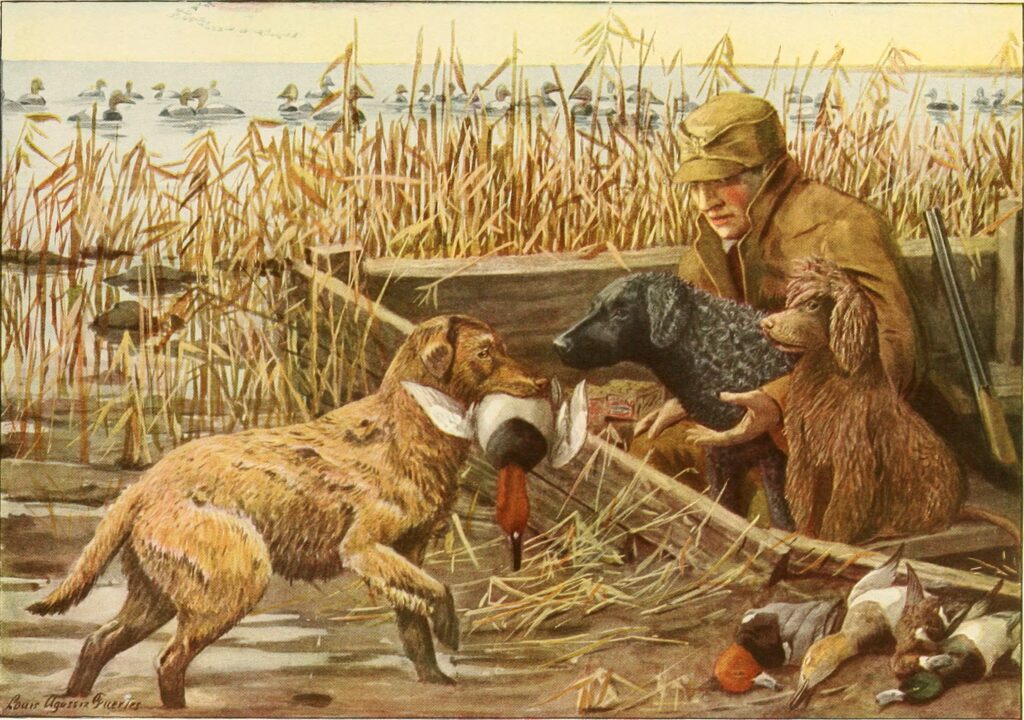
She would try her best to jump up and around and through the openings the cattails provided, but at a certain point she would just walk behind me, following my path. I urged her to keep hunting around and sometimes she would, and sometimes she wouldn’t. Eventually I stopped my prodding because I couldn’t blame her, and I wanted her with me if I went after a bird. She wouldn’t’ve waited for me to make a path if she could see over the cattails and see the birds go down.
I worked up a sweat walking then and my knees started to chafe on my thermal underwear and when we finally got out on the other side, the cold wind that avoided us during the walk hit hard, and the wetness of the sweat turned very cold. It was tough but we got a good number of birds, so we did a couple more lakebeds after that.
When we were finished in the fields and the beds for the day, we loaded up the dogs and stashed our guns. We drove through the gravel roads cutting through the rolling prairie spreading to the horizon, sprinkled with farm shacks surrounded by cedar trees and cattle grazing. We passed the occasional prairie dog town, seeing their heads peak over their earthy entries to their underground burrows. As a passenger, I watched the ditches periodically to catch a glimpse of rooster pheasants buried in the grass. We reached the highway, which took us to our motel.
We got back, cleaned the birds and fed the dogs after. I put her on a lead tied to a fence and put out water and food. She remained still when her collar was attached to the lead because she choked herself pretty good on it the first night trying to follow me while I was walking away. She was motionless on that lead until I put out food and only then she moved her head down to the bowl to eat. It was the same every night; after she was done eating and left on the lead, she would sit down at that same spot, looking for me, and when I came by, she would stand again. I went to her and let her off the lead and she stayed real close to me while we walked back to her crate. The crate was in the bed of a truck with a shell cover over top. She was able to jump onto the tailgate, but rarely ever did. She put her paws on the tailgate and I lifted the rest of her and she walked into her crate, turned her face to the door, laid down and let out a sigh. She was looking at me still.
“Good girl today,” I told her.
“Goodnight.”
I looked at the small cut on her head. She got it on the way up there from her crate door because she didn’t want to go back in after I let her out halfway through the trip. After the past two days of cleaning and applying adhesive, it was healing nicely and I hardly noticed it. I almost forgot about it.
I closed the crate and then the tailgate and camper shell. She was done for the day and she could rest until the morning.
In the morning, after two long days of hunting, she was tired. She let out a few deep yawns and her eyes were heavy and they had morning gunk around them.
She slept well. I coaxed her to get out of her crate and she did so with drowsiness rather than reluctancy. I saw her slow that morning and I could see all the soreness she had in her legs and paws. I smiled when I saw it. It did not take her long to wake up fully, and when she did, she let me know.
That last day we hunted the familiar plots and fields where we had the most luck in the previous days. We weren’t going through lake beds or any thick stuff though. We were tired and looking to quit a little early so we could rest before the long trip back home the next day.
I watched my dog while the birds weren’t flying. I was proud of her. It wasn’t the type of pride that I wanted to show or share. This was deep and it filled my chest and I couldn’t help but smile when I thought of it and I didn’t feel that way often. I didn’t want to talk about it because, once spoken, I thought it may end or be devalued in some way, or that she might mess it up, but she wasn’t messing up that day.
My pride grew when the other hunters would ask me what type of dog she was; I would answer them and warn them at the same time. She did not seem to care if I was proud and she was indifferent to affection until the day was over, and my pride grew more. I hunted each day, less worried about shooting a bird than wanting her to retrieve it.
We hunted the last field; as we walked along a wire fence through some tall grass towards a patch of cedars, the hunter who was walking beside me said to me,
“For her first time on a hunt like this, she did good. She’s been impressive.”
I didn’t say thanks, but I smiled.
“Yeah. She’s exceeded expectations.” I said, “She’s still a pain though.”
She continued ahead of us.
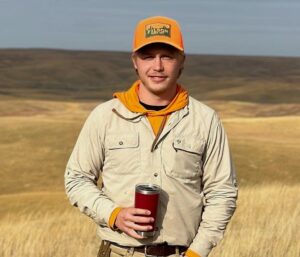
Craig Winkelmann
A civil engineer and sportsman from rural mid-Missouri who enjoys the outdoors, whiskey drinks, Nicaraguan cigars, hunting with dogs, old stories and short stories. He wants to see and learn as much as he can before he can't anymore.
Instagram: craig.winkelmann


You May Also Like
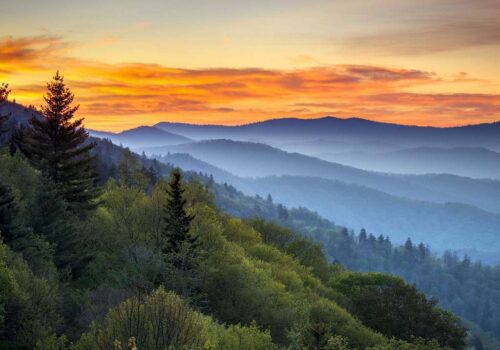
The High & The Low: A Guide to Southern Peaks and Valleys
March 7, 2024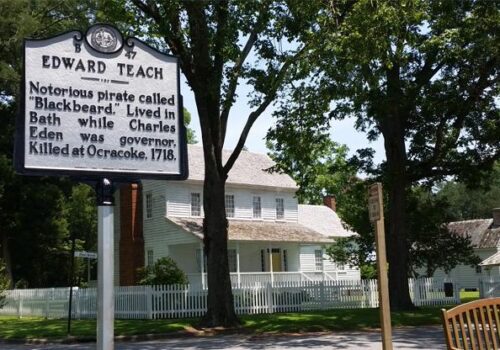
Bath, North Carolina
May 1, 2023